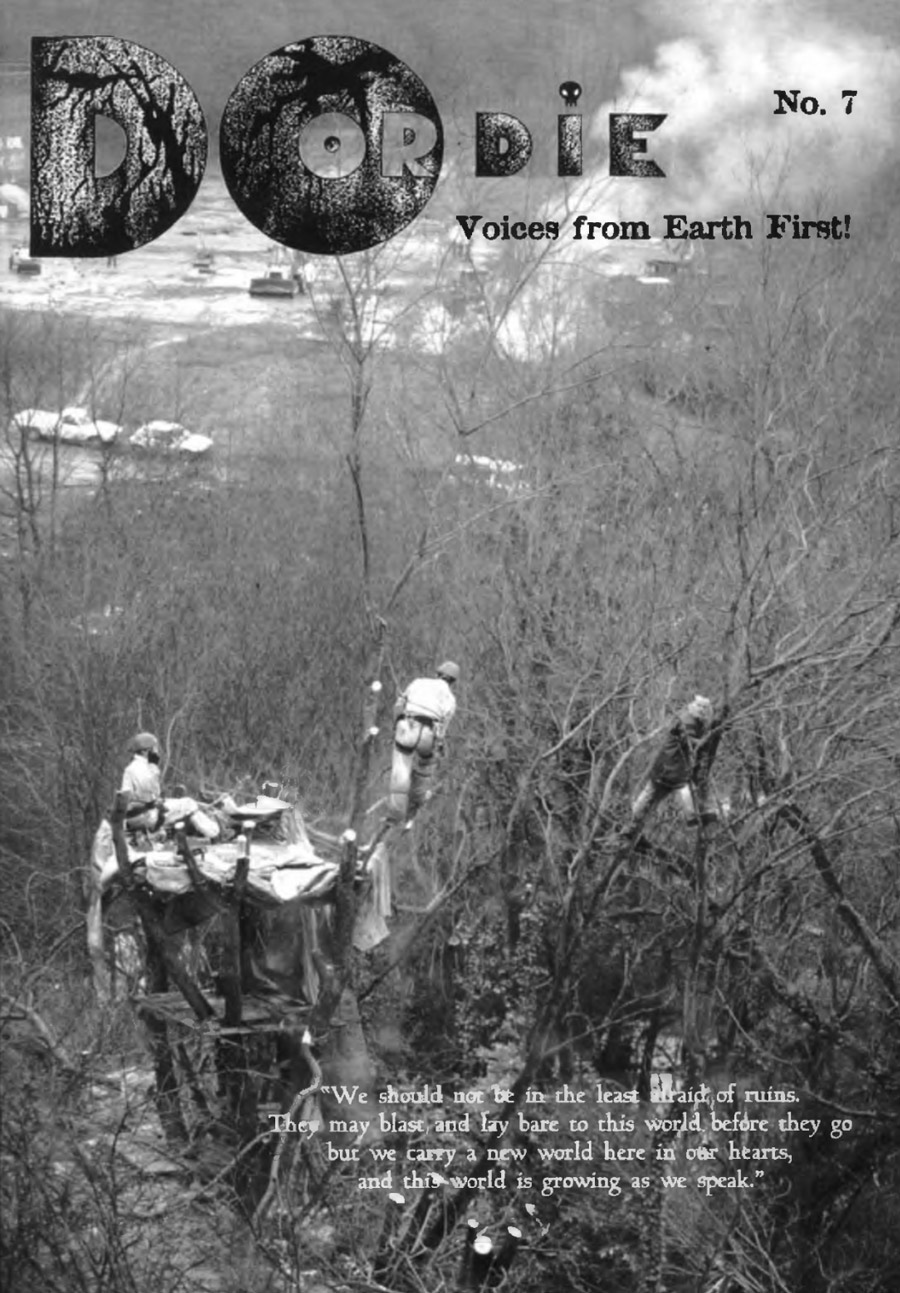
Reviews
Alt.Press
Reviews by Jelly Bean
Squall 16, Summer 1998, pg. 48.
Do Or Die
If you are the kind of reader who feels patronised or bored with the “we should be/do...” style of some of the underground’s outpourings then Do or Die No.7 (voices from Earth First!) is for you. A 166 page, A5, b/w book, DoD is not, and doesn’t try to be, representative of the ecological direct action scene; one brief glance through its pages, however, and it becomes clear that it may well be the most comprehensive collection of voices within it.
The book, as ever, is divided into three sections: These Islands, Other Islands and Odds and Sods. UK articles are many and include ‘No escape from Patriarchy’, presenting an honest and personal female appraisal of male dominance at protest sites and of male/female site dynamics.
An attack on Undercurrents in ‘Lights, Camera... Activism’ may not be fair but the points raised are questioning, intelligent and apply, more generally, to the whole issue of recording actions and the spectacle that these images create. As the prominent video recordists of DIY culture, Undercurrents naturally feature prominently. Along similar lines is ‘Personality Politics’ concerning the Spectacularisation of Fairmile, but here the involvement of mainstream media, and activists reactions to it, are analysed.
‘Farmageddon’ is a comprehensive look at industrial agriculture: its history, practices and global ramifications. The oil industry, ‘the heart of the beast’, comes under intense scrutiny and is followed by ‘Putting a spanner in the oil industry’s works’ which includes a map detailing the oil industry’s UK operations.
Other Islands contains reports from a squatted village in Spain (yes - a whole village), an article on Brazilian land struggles, first-hand impressions of Zapatista communities, pixies reclaiming Ireland and more.
Throughout the book, investigative articles are well-researched and well-sourced, providing useful histories, global ramifications, local tie-ins and activist information. Interspersed with photos, cartoons, reviews, news roundups, contacts, further reading and letters, DoD is a must. It contains very little rhetoric, has no answers and doesn’t pretend to. Do or Die is the information upon which to act.
A four issue subscription to Do or Die, is available for £8 (UK) and £10 (overseas) from
Do or Die, c/o PO Box 2971, Brighton, East Sussex, BN2 2TT.
* Libcom have the complete set of Do Or Die books viewable on an online archive - click here
Black Flag
For those who like their anarchism in a historical context, or who perhaps see themselves as DIY activists but view the concept of anarchism, and all the baggage that brings, with scepticism, Black Flag will be an enjoyable eye-opener.
Issue 213 covers more home news than is usual with GAndALF, the Irish peace process, opencast mining, prostitution, new labour, asylum seekers and prisoners of conscience.
Where Black Flag always excels is in its coverage of international news although, due to an enlarged home news section, issue 213 is more sparse on this front than usual. Issue 213 covers an excellent, interesting and comprehensive history of anarchy in Chile; beginning with the formation of the Chilean Section of the First International in 1872 and bringing us through victories and persecution to anarcho-syndicalism in 1997. Economics, sexual politics and new labour’s flirting with New York Mayor Giuliani all come under scrutiny.
Intelligent and concise, Black Flag is in touch with the roots of anarchy and seeks to contextualise current actions and events as part of an anarchist evolution. This is good stuff and provides information and opinion from the black flag brigade without the straight-jacket intellectualising and impenetrable language often associated with old-school anarchists.
Black Flag (A4, 36pp) costs £1.50 from: BM Hurricane, London WC1N 3XX (suggested 50p p&p).
Corporate Watch
Most Squall readers should be familiar with Corporate Watch, if you’re not; become so. Issue 7, Spring 1998 furthers CW’s growing reputation as an authoritative, substantial and solid information base. Exposing the usual multitude of vested interests, corporate irresponsibility and the downright greed of rampant capitalism, Corporate Watch 7 is an impressive 40-page, A4 tome.
The cover story focuses on the greenfield building programme planned by the Housebuilders Federation. Other features include dodgy American nuclear dealings in Bulgaria; a comprehensive look at the Asian economic crisis; an enlightening and tentatively inspiring look at co-operative models of economic development and ‘Selling starvation’ in which various multinational’s increasing monopoly of the world’s food sector means that six companies control 70 per cent of the world’s grain.
Campaign updates are thorough and this issue’s ‘DIY toolkit’ looks at the advantages of taking direct action to your least favourite company’s AGM ie “You’re unlikely to get cold, wet and muddy... you might get a good spread of food and drink and you’re very unlikely to be arrested.” Interspersed with news, views, contacts, reviews and further reading, Corporate Watch is highly recommended.
Corporate Watch costs £3 (plus 50p p&p) from Box E, 111 Magdalen Road, Oxford, OX4 1RQ.
* Present-day website https://corporatewatch.org
Related Articles
Alt.Mags - some selections of quality UK alternative print media - Squall 15, Summer 1997.
